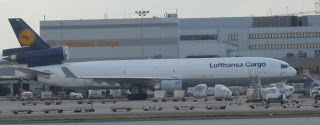
Zaragoza has a opportunity to become strong in cargo
(photo: a Lufthansa Cargo MD-11F at Frankfurt International airport)
I my recent series about "Spain's empty airports", I wrote about the amount of public money that has been devoted to create or upgrade airports in a number of cities that are unlikely to ever generate enough traffic to justify this investment.
However, I came across a case that might be just the opposite: Zaragoza airport (ZAZ) has little activity, which is a bit striking when taking into account the size of the city it serves. If you look at the 2009 ranking of Spanish airports by number of passengers, ZAZ ranked 28th (out of 48), only above airports with very little traffic, such as Leon or Logrono, or those devoted to private aviation. However, Zaragoza is the 4th largest metropolitan area in Spain with a population of around 700,000. The city is also home to a major logistics center, that takes advantage of its position at a crossroads between the Ebro Valley and the Barcelona-Madrid route.
But it is precisely this strategic geographical position, at the intersection of major overland transport routes, including high-speed railway lines, that might have prevent the city from developing a larger airport. The problem is simply that it is too well connected with Barcelona and Madrid and it is also just close enough to these two cities for air travel not to be competitive (there is admittedly a ZAZ-MAD daily flight operated by Air Nostrum, but this is an almost exclusively connection flight targeting a really niche market). It is this availability of good rail and road links where the opportunity lies: it is already the third airport in Spain in volume of cargo, still far from the top two, but growing strongly.
It must also be taken into account that ZAZ is an airport with a mixed civilian and military use (it is also designated as one of the alternative landing places for the Space Shuttle). The Spanish Air Force keeps a strong presence at ZAZ and air traffic and some other service remain in military hands.
I wonder to what extent military use has acted as a constraint on the airport's civilian development. Surprisingly, at a time of exuberant spending at many Spanish airports, including in nearby Huesca, it seems that ZAZ was left out of the party...



1 comments:
nice blog
Education
Post a Comment